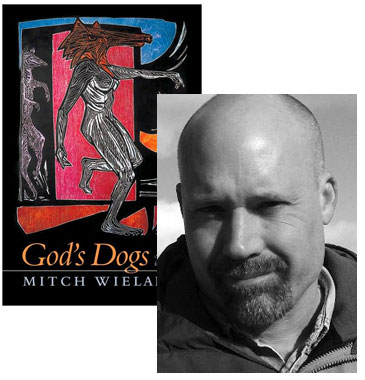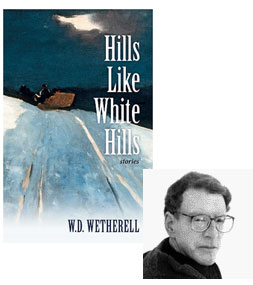Mitch Wieland Honors “Tandolfo the Great”

How sharp is SMU Press editor Kathryn Lang’s eye for fiction? Here’s a hint: I’ve been reliably informed that two of this year’s nominees for the Binghamton University John Gardner Fiction Award come from this university press. You’ve already encountered Tracy Winn, the author of Mrs. Somebody Somebody, through our current series of guest essays; now here’s Mitch Wieland, the author of God’s Dogs, a “novel in stories” about a man who put his past behind him to move out west only to have it (in the form of his ex-wife and her son) catch up to him and settle into the cabin. Well, maybe “settle” isn’t the right word… Anyway, I got hooked into Ferrell’s story early; as Fiction Writer Review notes, “In an age of books built from blogs, tweets, and text messages, Mitch Wieland’s new novel-in-stories feels as though it were made of wood.” Here, Wieland pays tribute to another story with a raw and natural power.
When I need a swift dose of beauty and wisdom, I read the stories of Richard Bausch. Bausch’s lyrical prose and fierce intelligence, his abundant compassion and generosity, never fail to restore me. To my mind, Bausch is truly our modern Chekhov. Like that grand Russian godfather of the short story, Bausch’s work offers luminous insight into our meager race.
“Tandolfo the Great” is classic Bausch. Here we have his graceful language, both spare and lovely at the same time. Here we have Bausch’s fantastic characterization, where we not only witness his people from the outside, the limited external view, but we experiencetheir rich inner world, gain privy to the private workings of their hearts and minds. This compelling psychological component is Bausch’s forte. If fiction is indeed about human yearning, as many of us propose, then look no further for a master’s exquisite rendering of our complicated needs and desires. As the story’s scenes unfold, we continually access Tandolfo’s emotions and feelings—always nuanced to the dramatic moment—and we know deeply his thoughts as he responds to the world.
In “Tandolfo the Great,” our hero is a twenty-six-year-old loner named Rodney Wilbury. As a side job, Rodney moonlights as a clown (“the Great Tandolfo”) who performs magic acts at social gatherings. Our story opens with Tandolfo, already slightly tipsy in the afternoon, as he finishes his clown makeup before his bathroom mirror:
“She loves you not, oh, she doesn’t, doesn’t, doesn’t.”
25 May 2010 | selling shorts |
W.D. Wetherell’s Most Vital Critique

There’s some good news on the SMU Press front—as you might recall, one of the reasons I featured four authors who had published short story collections at SMU last week was that the university was threatening to close down its publishing program, and I wanted to show you what a tremendous resource we’d be losing if that came to pass. Well, it’s still being shuttered, but according to the Chronicle of Higher Education, the university has decided to create a task force to decide whether it ought to resume publishing books and, if so, how to go about doing that. It’s not a happy ending—not by a long shot—but it leaves the door open a little longer.
In the meantime, I have a few more SMU authors I wanted to share with you, starting with W.D. Wetherell and Hills Like White Hills. These aren’t always easy stories to read; in “The Master’s Hand,” for example, a recent widow finally lashes back at the years of emotional and physical abuse she suffered at her husband’s hands by taking it out on his dog. They are, however, powerful stories—and, in this essay, Wetherell reveals a youthful encounter with Daphne Du Maurier that set him on a long (and not always clear) path to a certain type of heightened literary realism.
Fate, the future, is fully capable of tapping a thirteen-year old’s shoulder, poking him or her in the ribs, pointing where to look, but somehow you wouldn’t expect this to happen in an eighth-grade English class in the last boring period of the day.
Mr. Goodwin, to his credit, tried hard to make our forty minutes with him bearable. He was an unconventional teacher—tweedy looking, reed thin, not afraid to voice his left-leaning opinions. Artsy, too. He took literature seriously, made sure we knew the names of contemporary writers like J. D. Salinger and Shirley Jackson, not just Washington Irving. His classroom was the hardest to find in the entire school, a real garret tucked away under the eaves; hidden there, he could teach his class any way he wanted.
Which involved, on the day fate struck, reading out loud to us Daphne du Maurier’s story “The Birds.” A few years later it would become famous via Hitchcock’s film, and du Maurier already had a big reputation as a best-selling Gothic novelist, especially for “Rebecca.”
24 May 2010 | selling shorts |

 Our Endless and Proper Work is my new book with Belt Publishing about starting (and sticking to) a productive writing practice.
Our Endless and Proper Work is my new book with Belt Publishing about starting (and sticking to) a productive writing practice. 
